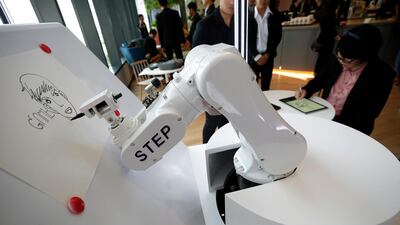Spending on artificial intelligence in the Middle East and Africa is expected to grow almost 43 per cent year-on-year this year as local businesses invest more on AI-enabled projects and platforms, according to a new report.
The amount spent on the technology in the region will reach $374.2 million by the end of this year, beating earlier estimates of $310.3m, said US research company International Data Corporation on Monday.
“The use of AI and machine learning is on the rise in a wide variety of business applications,” said Manish Ranjan, IDC's programme manager for the software and cloud markets in MEA and Turkey. “Vendors have started embedding these and cognitive applications to provide ultimate business benefits to end users.”
The UAE, Arab world's second-largest economy, is projected to benefit the most in the region from AI adoption. The technology is expected to contribute up to 14 per cent to the country’s gross domestic product – equivalent to Dh352.5 billion – by 2030, according to a report by consultancy PwC. The UAE will be followed by Saudi Arabia, where AI is forecast to add 12.4 per cent to GDP.
Over the long term, IDC expects AI spending in the region to increase at a compound annual growth rate of 19 per cent by 2023.
AI expenditure in the Middle East will be led by banking and retail industries. Together, these verticals will account for more than 33 per cent of investment in 2020, followed by central governments and the telecoms industry.
Investments in AI across MEA will be driven by a wide range of usage, particularly in three cases: automated customer agents; IT automation and automated threat intelligence; and prevention systems. These will account for around 30 per cent of total AI expense in 2020.
"With the growing adoption of various use cases across all industries, organisations are continuing to invest in their business processes … automating their operations and enhancing customer services," said Mr Ranjan.
IDC's forecast shows South Africa will account for 20.5 per cent of AI spending in MEA in 2020, followed by the UAE and Saudi Arabia at 19.7 per cent and 15.7 per cent, respectively.
Technology leaders expect a worldwide rise in the use of AI in the coming years.
“AI will be certainly applied on a large scale,” said Ren Zhengfei, chief executive and founder of Huawei, at an event discussing emerging technologies in Shenzhen this week.
“This technology will just create greater wealth… [and] fundamentally change how the international community develops,” he added.
Jerry Kaplan, an American computer scientist and entrepreneur, said AI offers a “new wave of automation” that will create more jobs.
“As we become wealthier, demand will be created. We get a new middle class and new demands for goods and services. It will change the nature of labour and not put people out of work,” said Mr Kaplan at Huawei's open dialogue event in Shenzhen.
A World Economic Forum report published last year said emerging technologies such as AI and robotics are expected to generate more jobs than they destroy. It predicted the loss of nearly 75 million jobs by 2022, and the creation of 133 million new jobs over the same period.
“People are worried that AI will cause unemployment, disrupt social structures, and distort our ethics. People should have more trust and tolerance towards new things,” said Mr Ren.
Many tech companies have also taken steps to address ethical issues in AI application. For instance, Alphabet-owned Google is giving away $25 million (Dh91.83m) to projects that propose ways to use AI in building a more humane society. Microsoft has also committed $115m to an "AI for Good" initiative.


